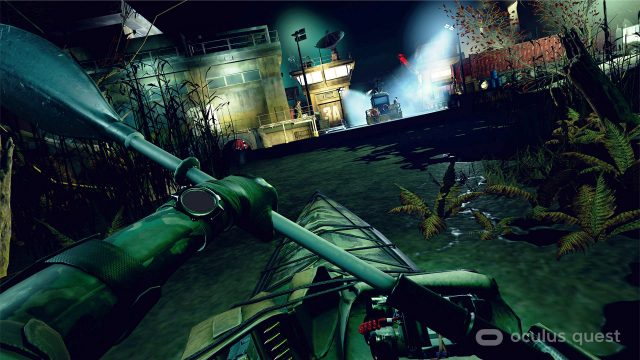The much lauded Echo VR might no longer be with us, but one of its innovations is living on in a new wave of VR games.
Echo VR (and its single-player counterpart, Lone Echo) were among the first major VR games to build a game around a virtual movement system based entirely on the player’s arm movement. While most VR games used (and continue to use) thumbsticks to allow players to glide around on their feet, the Echo games actually gave players no control over their feet, and instead had them floating around exclusively in zero-G environments with only their hands to push and pull themselves around the game space.

While other early VR games definitely contributed to the idea of arm-based movement rather than sliding thumbstick movement (shout-out to Lucid Trips Climbey, Sprint Vector and many more), the Echo games did a lot of heavy lifting to popularize this novel locomotion concept.
And from there, the idea has grown and evolved.
Gorilla Tag (2021), whose creator specifically says he was inspired by Echo VR, has become one of VR’s most popular games, bringing its spin on arm-based locomotion to a much wider audience. With that exposure, more and more players are learning how this particular way of moving in VR can be fun, making them more likely to try games with similar mechanics.

And this goes far beyond the smattering of Gorilla Tag clones you can find on Steam.
Nock (2022) went several steps further with a much faster type of sliding and gliding arm movement, while also weaving in bows and arrows, challenging players to both navigate and shoot with their hands in a continuous flow.
Space Ball (2023) took the Gorilla Tag movement and fused it with a Rocket League style game, letting players bound around the arena and launch themselves to dunk a huge ball into a hoop.
It’s not just multiplayer games either. Arm-based locomotion systems are popping up in single player adventures like Phantom Covert Ops (2020) which had a very literal take on arm-movement in VR—asking players to paddle themselves around in a covert kayak. It sounds silly on the surface, but there’s no doubt the game’s arm-based movement was both unique and successful.

In 2023 alone we’ve seen more arm-based movement games like No More Rainbows, Toss!, and Outta Hand. If you peruse the reviews of these games, you find a common theme of advice from reviewers: ‘if you liked Gorilla Tag, check this out!’. Clearly the players enjoying these games want more like them, with the desired similarity being the use of arms for movement.
And there’s more to come. One of the most intriguing upcoming Quest titles, Underdogs, takes the concept in a different direction, where a player brawls it out in a mech using their arms to pull themselves around the arena.
And in a truly full-circle moment, the creators of Gorilla Tag (which were inspired by Echo VR) are building a spiritual successor to Echo VR. Currently codenamed ‘Project A2’, the game will revisit arm-based movement in zero-G in an effort to revive the very game that popularized arm-based movement to so many in the first place.
It’s apparent that VR developers and players alike are beginning to find that controlling your arms with… your arms, is much more engaging than controlling your legs with… a thumbstick. I have a feeling that this new wave of games built entirely around arm-based movement is here to stay. The question on my mind is if they will remain as their own genre within VR, or perhaps come to define the way movement works in most VR games.












